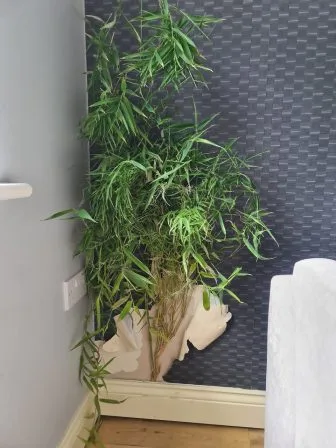
Homeowners have long been warned that invasive bamboo can be more damaging to a property if left unchecked, with surveyors increasingly flagging it up as an issue when affected properties are bought and sold, forcing sellers to either take action to remove it or accept a discount on the price to reflect removal costs.
Between June and December 2023, invasive plant specialist Environet saw a 55% annual increase in enquiries for bamboo removal relating to property transactions, indicating that buyers are becoming more aware of the risks and insisting that problematic bamboo infestations are dealt with.
According to Environet, there are a ‘running’ variety of bamboo, with some already posing a threat to underground services, including pipes and drains, and there are cases where it has affected neighbouring properties.
Hardy, fast-growing and tolerant of most soil types, bamboo is popular for its screening qualities, creating privacy in overlooked gardens. Commonly planted in borders and along boundary fences, it has the ability to push through brickwork, drains, patios, cavity walls and even cracks or weaknesses in concrete.
In 2022, at a property in Hampshire, a bamboo infestation that had spread from next door exploited a weakness in the foundations of a property to emerge through the floor in the living room, hall and kitchen, resulting in the excavation of the entire ground floor at a cost of over £100,000.
Nic Seal, founder of Environet, said: “In my view, bamboo is at least as destructive as Japanese knotweed, due to the astonishing rate at which the runners grow, enabling it to spread and cause damage more quickly.
“Surveyors are flagging the issue much more frequently than they were a couple of years ago and buyers are rightly insisting that bamboo infestations are properly dealt with.
“In addition to damage to the property and garden, buyers need to consider the risk of a legal case from a neighbour if the bamboo has encroached into their property, which could be expensive to resolve.”
Sellers are legally required to declare the presence of Japanese knotweed on a property when completing the TA6 Property Information Form, but bamboo does not need to be declared. Buyers and agents are therefore advised to be vigilant for signs of the plant on viewings, for example, canes which have been cut back, or new shoots emerging from the ground. A good surveyor should flag a bamboo infestation that has running the risk of damage or encroachment, and a professional bamboo survey will determine the extent of the infestation and estimated removal costs.
Original Post from propertyindustryeye.com



